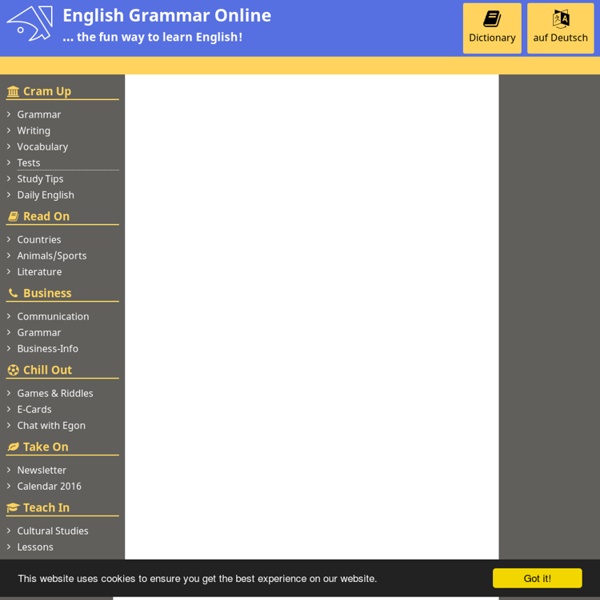



http://www.ego4u.com/en/cram-up/tests/simple-present-1
Related: emvivSimple Past Exercises on Simple Past The simple past expresses an action in the past taking place once, never, several times. It can also be used for actions taking place one after another or in the middle of another action. It’s not always easy to find a condensed handout that explains the basics of a particular grammatical structure. I recently created this one for the simple present tense for my class. I’m planning to do some activities this week on the simple present, and I want them to have this handy if they forget a particular structure. Present Simple Verbs (Letitia Bradley a4esl.org Present Simple Verbs Click the answer button to see the answer. Simple Present [VERB] + s/es in third person Examples: You speak English. Two Wonderful Visual Lists of Educational iPad Apps for Teachers and Students In their attempts to establish a 1:1 program for the year 6 class, St Oliver Plunket has recently held a series of workshops in order to develop their students skills before they were officially given management of their very own devices. The workshops were particularly centered around teaching students about some tips and tricks for managing their iPad, email etiquette, successful searching and copyright and creative commons. I personally was thrilled by the efforts these people from St Oliver are putting into making their 1:1 program a success and I hope other schools would do the same. What attracts my attention more than anything else in this program are the two lists of core apps curated for both teachers and students.
The Pink Panther 1) He (break) the alarm clock. Fill the gap: He ________________________ the alarm clock. 2) Choose the right answer. He wakes up. TELL TIME MONSTERS gramatica de los verbos regulares en pasado El pasado simple - Verbos regulares En inglés, el tiempo pasado simple refiere al pretérito, un tiempo gramatical en cuando una acción ocurió y fue completado en el pasado. Para verbos regulares, el pasado simple normalmente se forma al añadir -ed al infinitivo (sin to). verbo + ed = pasado simple (pretérito) walk caminar walked push empujar pushed greet saludar greeted cover cubrir covered Verbos que terminan en vocales Para verbos regulares que terminan en el vocal -e, añada solamente -d. bake cocer baked prize apreciar prized hope esperar hoped assume suponer assumed tie amarar tied hoe azadonar hoed free liberar freed Muy pocos verbos en inglés termina en un vocal que no sea -e.
Creative writing tips for teachers: ideas and activities to inspire your class Engaging children and encouraging them to write has become increasingly difficult in the classroom. My children are bombarded with interactive and visual images constantly through the media and the internet and, as their teacher, it has become much harder for me to compete. Who wants to read or write an emotional descriptive piece when they can be fully immersed in this feeling through interactive game play? This challenge has led me to look at how I can use these media, and more dynamic approaches, to engage children in wanting to use their literacy skills and to hook them into becoming creative and thoughtful writers.
Reglas De Pronunciación De Los Verbos Regulares En Inglés - Ensayos - Noextraordinario Reglas de Pronunciación de los Verbos Regulares en Inglés Los verbos regulares son aquellos verbos que en su forma en pasado (Pasado Simple o Pasado Participio) se escriben con la terminación "ed". Su construcción es simple ya que se forman de la forma infinitiva + la terminación “ed” Ejemplo: Melt [Forma infinitiva] + Terminación “ed” = Melted Derretir Lesson 37: Let's Agree to Disagree Download Lesson 37 Speaking Pronunciation Conversation Anna: You know, I am from the country and sometimes I miss it. But I really like life in the city! Inglés: El presente simple El presente simple, también llamado del indicativo, es el tiempo verbal más simple del inglés. Se suele utilizar para hablar sobre hechos que constituyen hábitos o costumbres. Se forma con la forma base del verbo del infinitivo.